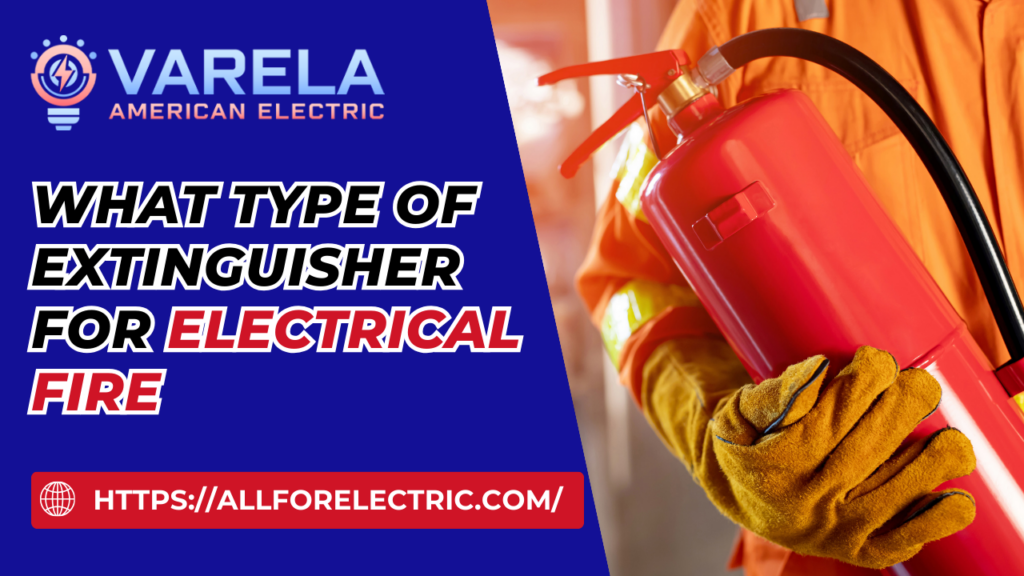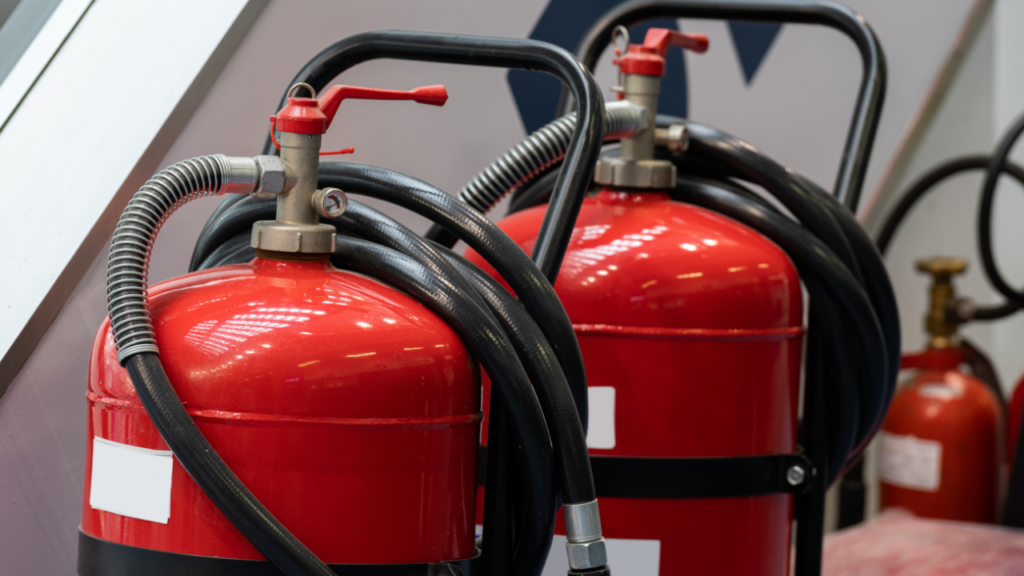
Being equipped with the right knowledge and tools to handle emergencies is crucial. Understanding the different types of fire and their extinguishing methods is essential, especially when it concerns electrical fires. Let’s delve into what type of extinguisher for electrical fire should be used for electrical fires and explore the causes and nature of such fires. Making informed decisions during critical situations is significant, so let’s embark on this journey together for better fire safety.
Electrical Fires:
Electrical fires can be dangerous and cause significant damage to property and lives. It is crucial to understand the risks associated with electrical systems, including those related to commercial electricals, and take the necessary precautions to prevent such fires. Faulty wiring, overloaded circuits, and malfunctioning appliances are common causes of electrical fires. Routine inspections, appropriate maintenance, and observance of safety rules can decrease the possibility of these fires. It is also essential to have working smoke alarms to alert and suppress potential fires. We can protect ourselves from the harmful consequences of electrical fires.
One of the primary dangers associated with electrical fires is the risk of electrocution. Attempting to extinguish an electrical fire increases the chance of encountering live electrical currents, leading to severe injury or fatality. Moreover, these fires produce toxic smoke and gasses, heightening the risk to nearby people.
The Importance of Using the Right Extinguisher: Using the correct type of extinguisher for electrical fire is crucial as it minimizes risks and suppresses flames. Electrical fires require specific extinguishing agents that do not conduct electricity, preventing further damage or injury.
Types of Fire Extinguishers:

Various fire extinguishers for electrical fire class are available, each designed to combat specific fire types. Let’s examine some common types and their labels:
- Type A Label: Designed to combat fires involving ordinary combustible materials such as wood, paper, and cloth. While they can help in the initial stages of electrical fires, they’re not recommended for developed ones.
- Type B Label: Suitable for fires caused by flammable liquids like gasoline, oil, and grease but ineffective for electrical fires.
- Type C Label: Specifically for fires involving live electrical equipment, these extinguishers are non-conductive and ideal for electrical fires.
- Type D Label: Intended for combating fires involving combustible metals like magnesium, sodium, and titanium, but unsuitable for electrical fires.
- Type K Label: Primarily for fires in commercial kitchens involving cooking oils and fats. Though not designed for electrical fires, they can be a secondary option if a Type C extinguisher is unavailable.
Explanation of Each Type and Suitable Applications:
- Water-based extinguishers use water to suppress fires and are effective for ordinary combustible materials like wood and paper. However, they should never be used on electrical fires due to their conductivity, posing a significant risk of electrocution.
- Carbon dioxide (CO2) extinguishers displace the oxygen around the fire, suffocating it. They are safe for use on electrical fires as they do not conduct electricity. However, caution is advised in confined spaces due to the risk of oxygen deprivation.
- ABC fire extinguisher for electrical fire and BC types of dry chemicals are versatile and effective against various fires but may cause damage to electrical equipment.
- Halon extinguishers, though no longer produced due to environmental concerns, were particularly effective for extinguishing electrical fires without causing damage to equipment.
- Foam extinguisher for electrical fire create a smothering effect, separating the fire from its fuel source. While effective for certain types of fires, they are not recommended for electrical fires due to their conductivity.
How To Selecting the Appropriate Extinguisher:
We’re here to provide the information you need to make an informed decision. Read on to discover the key factors to consider when selecting. When it comes to enhancing the security of your property, one crucial aspect is lighting. Installing a security light can significantly contribute to a safer environment.
1. Assess the Fire Hazards: Start by identifying the potential fire hazards in your surroundings. Consider the types of materials present, such as flammable liquids, electrical equipment, or combustible materials.
2. Understand Fire Classes: Familiarize yourself with the different fire classes to determine which type of extinguisher for electrical fire suits each. Class A is for ordinary combustible materials like wood or paper, while Class B is for flammable liquids. Class C is designed for electrical equipment, and Class D is for combustible metals. Class K extinguishers are designed for kitchen fires involving cooking oils and fats.
3. Check the Ratings: Look for fire extinguisher for electrical fire class that have been tested and certified by recognized organizations. Check the ratings on the extinguisher, such as the numerical rating for the fire size it can handle and the letter rating for the fire class it is suitable for.
4. Consider Size and Weight: Evaluate the size and weight to ensure they are manageable for individuals needing them. Larger extinguishers have greater fire-fighting capacity, but it’s essential to balance effectiveness and ease of use.
5. Accessibility and Visibility: Place extinguishers in accessible locations, ensuring they are visible and not obstructed by objects. Consider installing additional signage or indicators to guide people toward the nearest.
6. Maintenance and Training: Inspect and maintain according to manufacturer guidelines. Additionally, provide proper training to individuals, ensuring they are familiar with its operation and safety precautions.
Selecting the appropriate fire extinguisher for electrical fire is crucial for immediate response and effective fire control. By following these steps, you can enhance safety in your environment and protect lives and property.
Recommended Extinguisher for Electrical Fires:
The correct fire extinguisher for electrical fire is a CO2 extinguisher. CO2 is non-conductive, leaves no residue, and is safe for use on energized electrical equipment. These extinguishers work by displacing oxygen, suffocating the fire. However, be cautious of the extreme cold when a CO2 extinguisher is discharged and avoid direct skin contact. Proper ventilation is crucial as CO2 can replace oxygen in confined spaces.
FAQs:
Q1: What type of extinguisher should I use for an electrical fire?
A: For electrical fires, it is recommended to use a Class C fire extinguisher designed for extinguishing fires involving live electrical equipment.
Q2: How does a Class C fire extinguisher work?
A: Class C extinguishers interrupt the electrical current and remove heat from the fire. They contain a non-conductive extinguishing agent, such as CO2 or a dry chemical, which does not conduct electricity.
Q3: Can I use a regular fire extinguisher for an electrical fire?
A: No, using a regular type of used extinguisher for electrical fire is unsafe. Water-based extinguishers, such as Class A or B, conduct electricity and can lead to electric shock or further damage.
Q4: Are there any specific safety precautions when using a Class C fire extinguisher?
A: Yes, when using a Class C fire extinguisher, it is essential first to shut off the power source if possible to minimize the risk of electric shock. Additionally, always follow the instructions on the extinguisher and maintain a safe distance from the fire.
Q5: How do I use the appropriate extinguisher for electrical fires?
A: To use the appropriate extinguisher for an electrical fire, follow these steps:
- Pull the safety pin from the extinguisher.
- Point the nozzle towards the fire’s base.
- Squeeze the handle to discharge the extinguishing agent.
- Sweep the nozzle from side to side, covering the entire fire area.
Conclusion:
Knowing which dry powder fire extinguisher for electrical fire is crucial for safety. Handling electrical fires can have disastrous consequences. Fire safety training is essential to be well-prepared for such emergencies. Always prioritize safety for yourself and others when dealing with fires.
Seeking professional advice and training in fire safety is always recommended. Proper education and training provide people with the necessary information and skills to prevent electrical fires and handle other fire emergencies. Stay informed and stay safe.